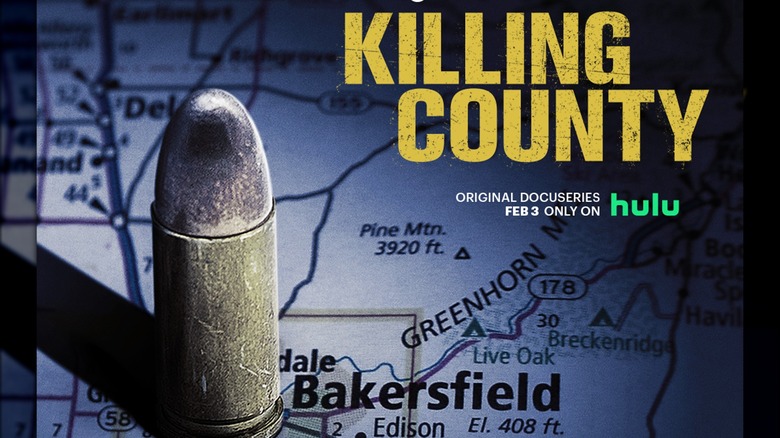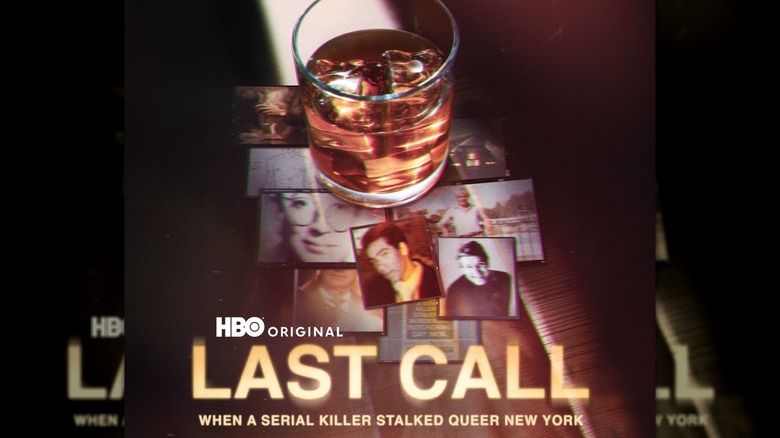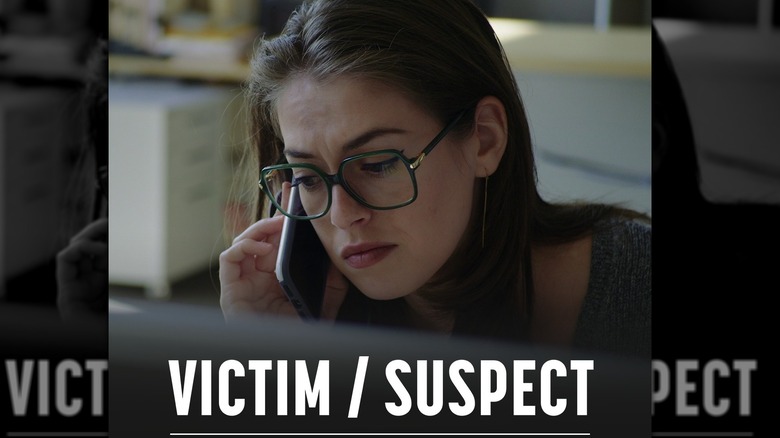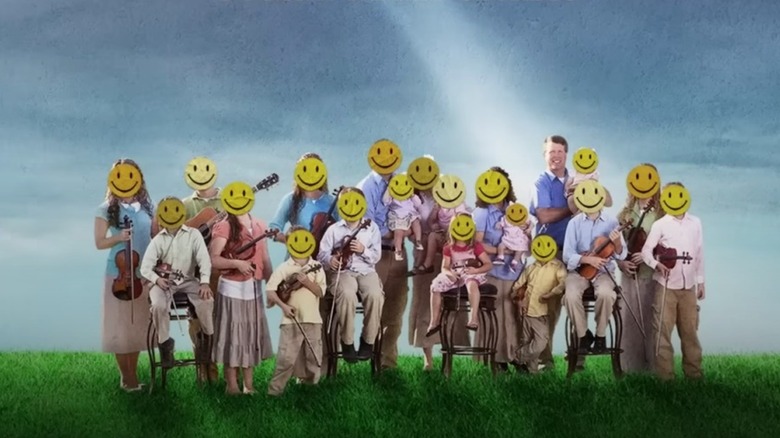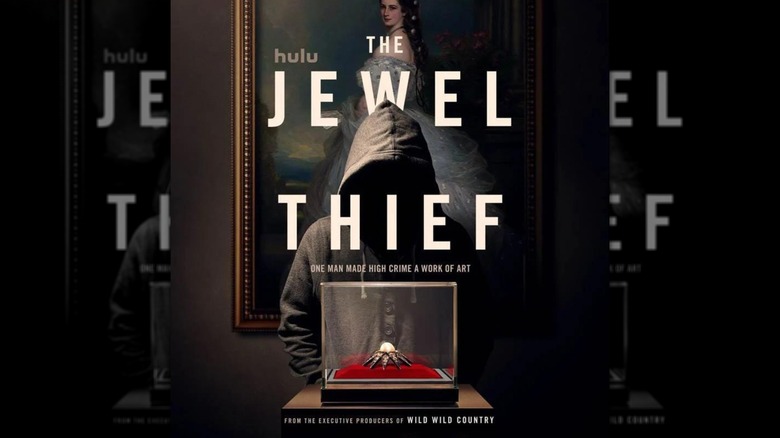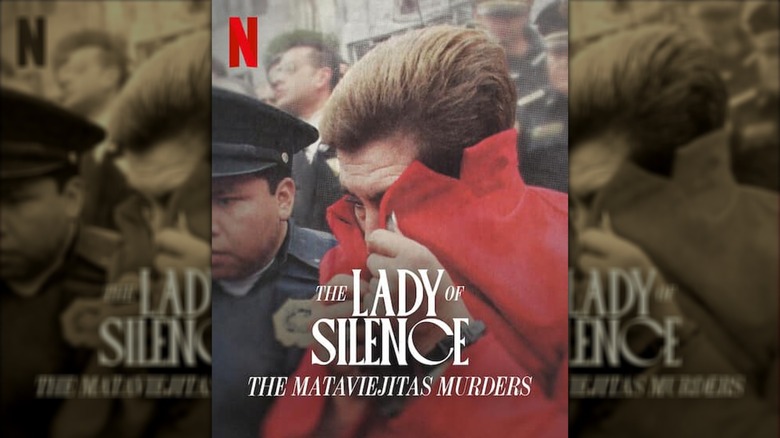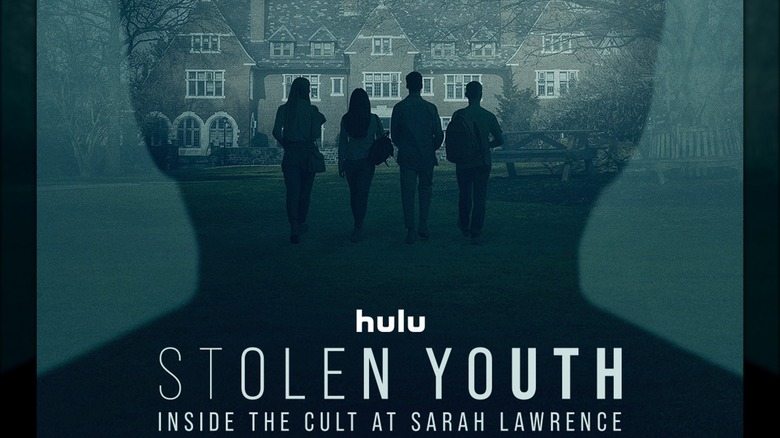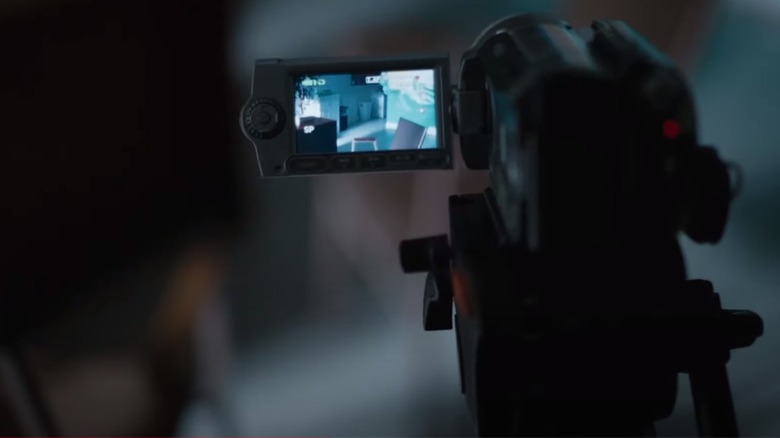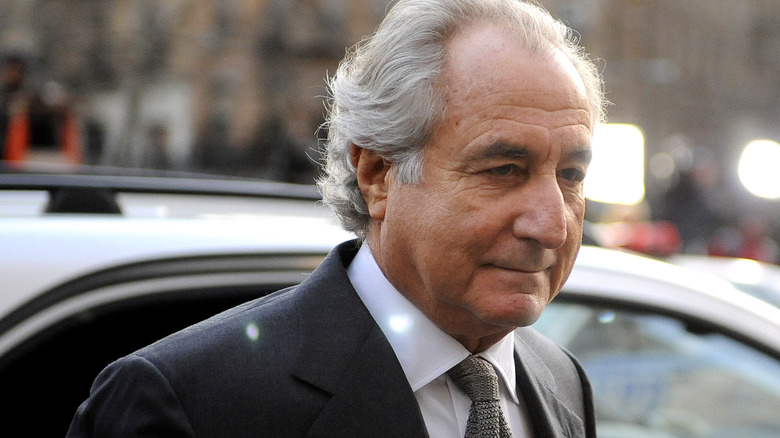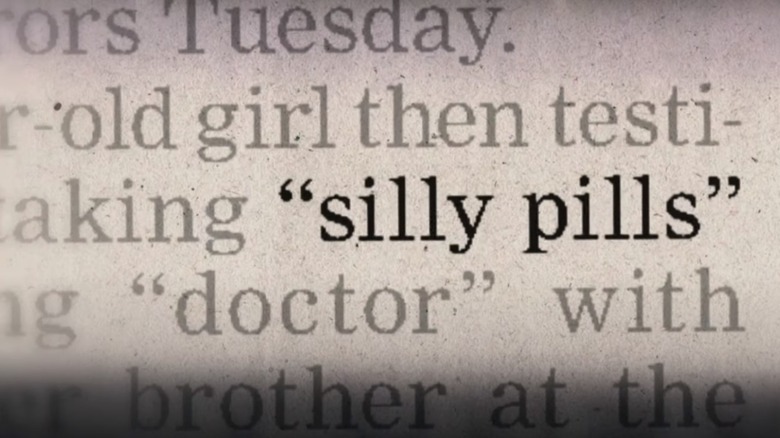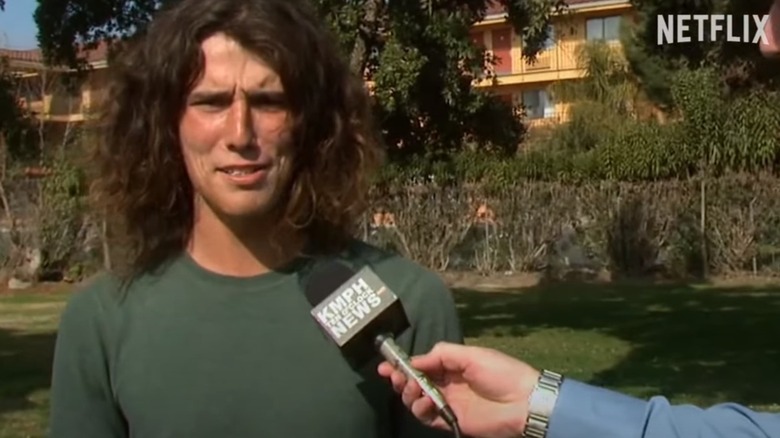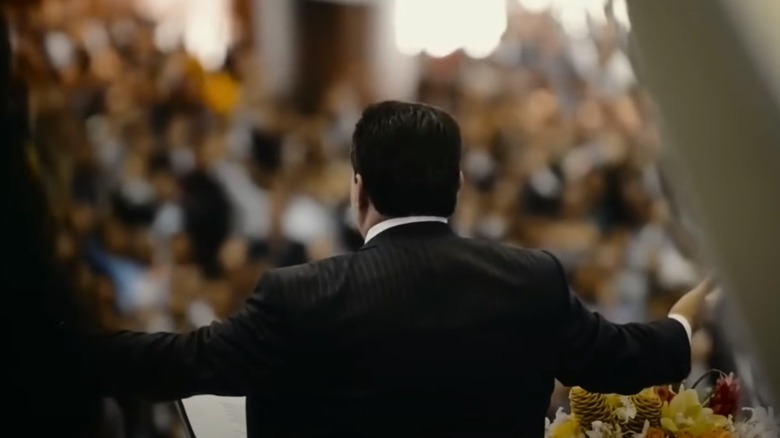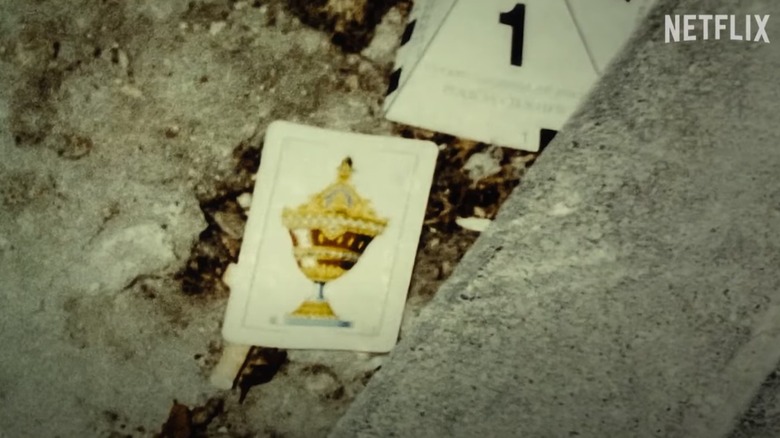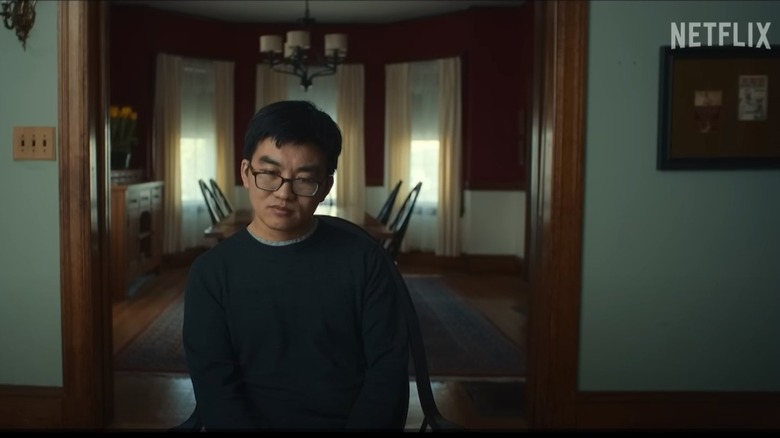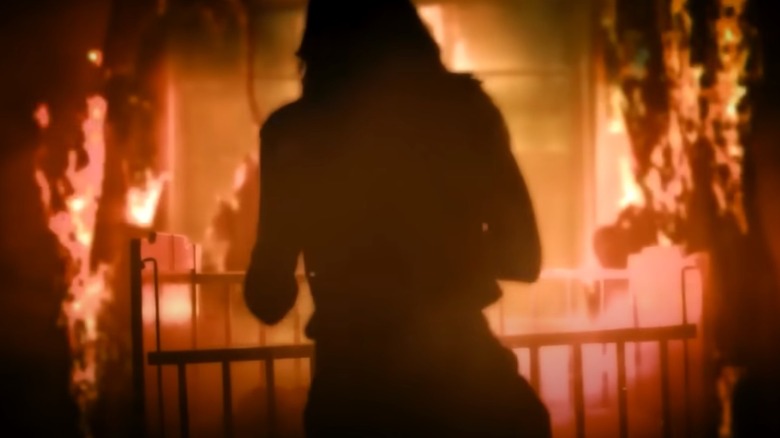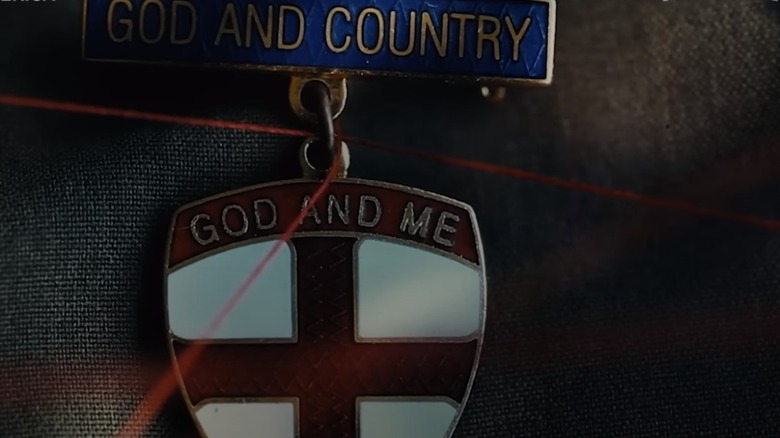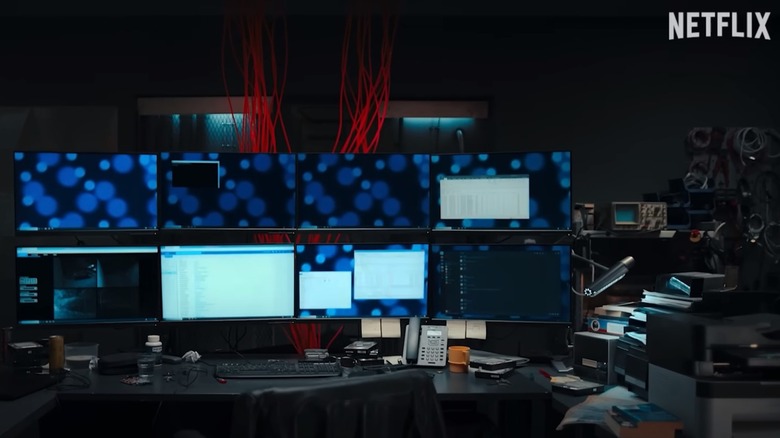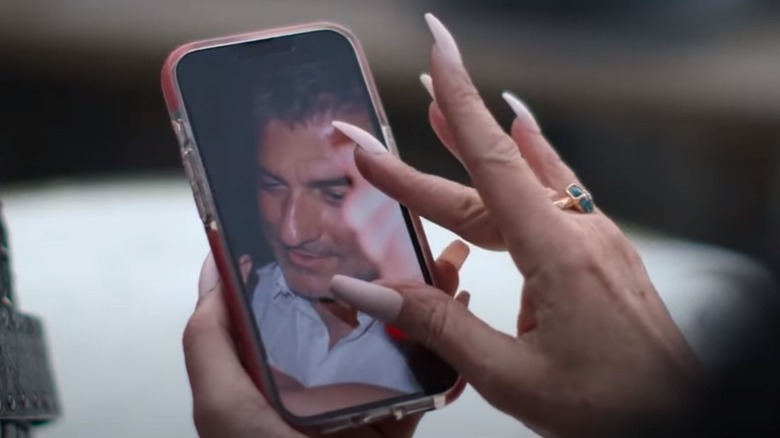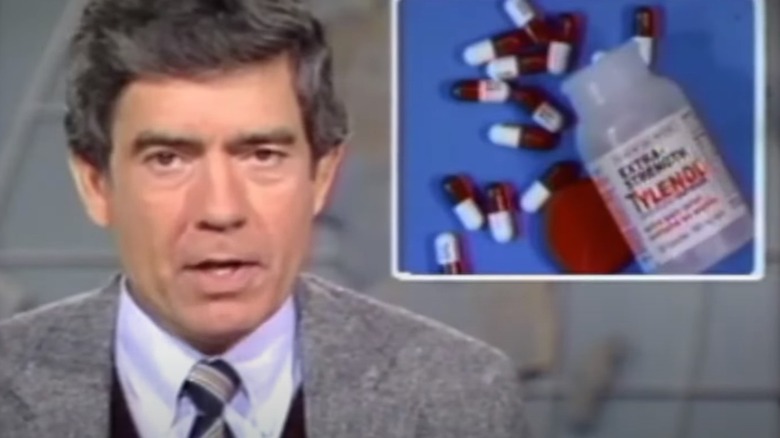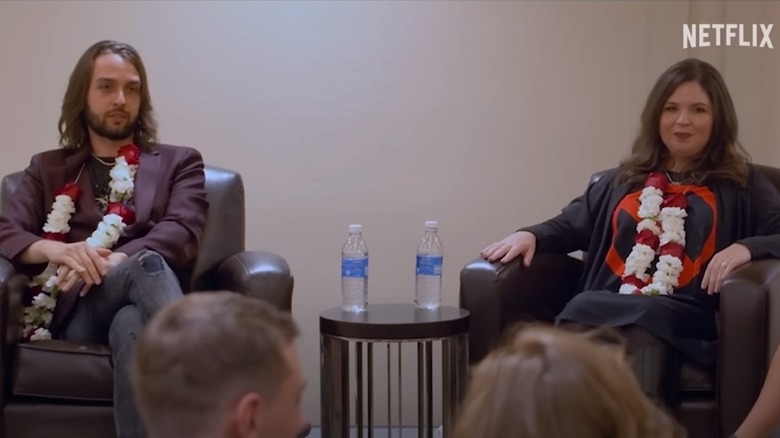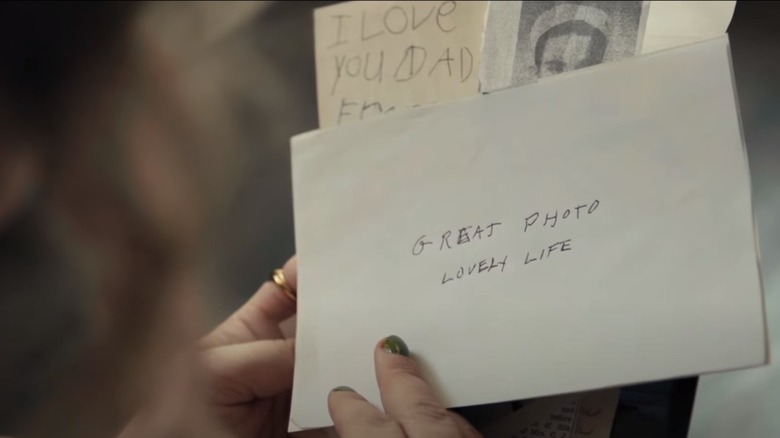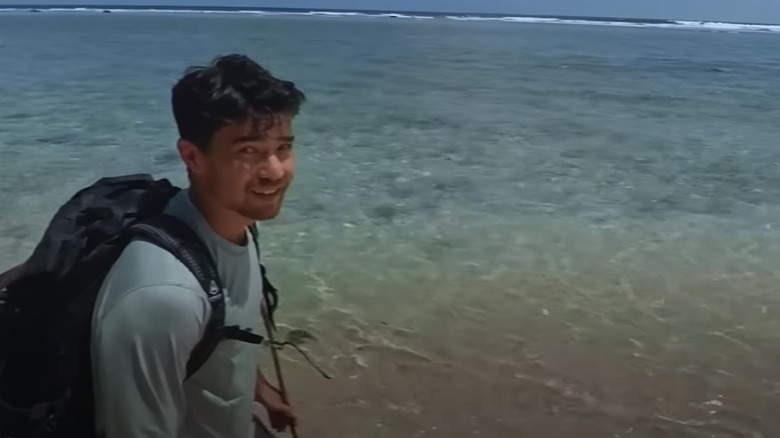Best True Crime Documentaries Of 2023
Delving into the newest true crime documentary or docuseries can definitely feel like a bit of a guilty pleasure. It is, after all, taking the worst moments of someone's life and putting them on the small screen for everyone to see, from the comfort of their own sofas and over a bowl of popcorn. Weird? For sure ... but it doesn't have to be, especially when they're done right.
That can mean a variety of things, including telling the story in a way that doesn't glamorize the crime and the criminals. It can also mean paying extra attention to the victims, and that's something that's historically not been done too much. (After all, how many of John Wayne Gacy's victims can the average person name? How about Ted Bundy? Or Richard Ramirez?) It also means telling the stories that need to be told, and while that can often make for very uncomfortable watching, it can also be potentially life-changing for those who need it the most.
That said, let's talk about some of the best, don't-miss true crime documentaries of 2023. But first, a disclaimer: This will be spoiler-free. We'll talk about why you should watch these and give enough information to make a choice on whether or not you're going to want to spend some precious free time tuning in, but for anyone who doesn't want to know whodunit, well, that's their story to tell.
Killing County (Hulu)
True crime documentaries about serial killers, jewel thieves, and con men are kind of the norm — so what happens when the lens gets pointed toward the very people that are supposed to serve and protect? That's what happens with Hulu's "Killing County," which shines a rather disturbing light on the Bakersfield Police Department, and the accusations of corruption and misconduct that have left families demanding answers.
Produced by Colin Kaepernick and narrated by Andre Holland, the series focuses on the story of several men killed by law enforcement. Among them are Jorge Ramirez Jr., who was acting as a police informant when he was shot and killed in a hotel parking lot, and James De La Rosa, who was shot and killed after being pulled over by police — who were later accused of tickling and joking about his dead body. Francisco Serna's story is also told: He had been diagnosed with dementia and was shot and killed after officers responded to a call placed by his neighbor, with whom he had reportedly argued.
After the release of the documentary, the Bakersfield Police Department released an official statement (via Bakersfield Now) that claimed inaccuracies in the reporting, and that anyone involved with misconduct had "been held accountable." Meanwhile, the family of Ramirez spoke with KGET News, calling the documentary a way to hold law enforcement accountable and reveal the truth so their beloved brother can rest and they can heal.
Last Call: When a Serial Killer Stalked Queer New York (Max)
All too often, true crime documentaries end up glamorizing the crimes they're talking about, and that seems to be particularly true when the subject is a serial killer. "Last Call: When a Serial Killer Stalked Queer New York" turns that upside down, though, and instead, it focuses on the victims: Thomas Mulcahy, Peter Anderson, Anthony Marrero, and Michael Sakara. And it works: Time calls it "the rare true-crime doc that does right by the victims," and that's incredibly important.
When the so-called Last Call Killer was stalking New York City's gay bars in the early '90s, being gay was still the sort of thing that many people just didn't talk about — and the families of the victims address that, condemning the indifference of law enforcement and society as a whole. Also front and center is a reminder of the damage done by an openly homophobic stance taken by the NYPD, with families sharing what it felt like to know that their loved ones were seen as unworthy.
"Last Call" has a well-deserved 100% on Rotten Tomatoes, and it's an important reminder that the victims deserve a prominent place in the narrative. The doc paints a poignant picture of families still grieving while lauding the activist groups that formed the cornerstone of New York's LGBTQ+ community, and the tireless voices who refused to let indifferent authorities forget about the men who were killed, dismembered, and disposed of.
Victim/Suspect (Netflix)
With the rise of the #MeToo movement, more women are coming forward to report sexual assaults — recent and otherwise. They're often met with doubt, and it's that doubt that's at the heart of Netflix's "Victim/Suspect." Here's the thing: It's hard to watch, but that's exactly why it should be watched.
The documentary follows the work of investigative journalist Rachel de Leon (pictured), who looked into the shocking number of cases in which women reporting sexual assaults are arrested themselves, often accused of making false police reports. The stories are often horrifying: The project started with University of Alabama freshman Emma Mannion, who reported a rape, then was arrested for so-called inconsistencies in her story. She would ultimately accept a plea deal, later saying that she did it because she didn't want the same thing to happen to her that happened to classmate Megan Rondini. After Rondini reported her rape, she found her photo plastered all over social media and died by suicide less than a year later.
De Leon has looked into more than 160 such cases, and director Nancy Schwartzman described her goal to The Guardian: "We are there to look at whether the police did a proper and thorough investigation ... And what we found was that they stopped the investigation midway, completely dropped it, did not follow up on very clear leads, and then prosecuted the victim."
Shiny Happy People (Amazon)
When "19 Kids and Counting" premiered in 2008, it would have been unthinkable that the story of the Duggar family would be featured in an Amazon true crime series just a little over a decade later... but here we are. At the time of the TLC show's heyday, it was a harmless sort of train wreck, leaving viewers wondering how they managed to juggle the logistics of 19 kids. Then there came the accusations that the eldest, Josh, had molested several of his siblings, and those accusations just sort of disappeared. Until, that is, he was convicted on charges related to child sexual abuse images, and until "Shiny Happy People" did a deep dive into the Christian fundamentalist group that the Duggars had been a part of.
What unfolds throughout the documentary are accusations of sexual assault, harassment, and a cult-like amount of control over members. Themes of isolation and abuses packaged as religious beliefs are prevalent, and it's shocking stuff not only because it happened, but because millions of people tuned in regularly to watch one of the families that was front and center in it all.
"Shiny Happy People" has a 100% on Rotten Tomatoes, and while it's impressive, it's also terrifying. It isn't, after all, just about what went on behind closed doors, it's about how it was repackaged for mass consumption under the guise of a quaint but loving family.
The Jewel Thief (Hulu)
Most true crime documentaries are about the hunt for the perpetrator and the search for justice, but Hulu's "The Jewel Thief" is a little bit different, as Gerald Blanchard was captured a long time ago. The small-time Canadian shoplifter-turned-bank robber set his eye on larger and larger prizes, and the largest of them all? A piece of Vienna's crown jewels.
The documentary's director, Landon Van Soest, explained to the Los Angeles Times just why Blanchard makes for a fascinating subject: "I've been obsessed with the story for a decade," he explained. "He can be kind and polite, but we're dealing with a criminal with a lot of antisocial behavior. As far as I know, no one was ever hurt in his crimes, but he clearly had a dark side."
Blanchard's crimes are the stuff of a crime thriller rather than a documentary, and that's only a small part of what makes this one so fascinating. To hear Blanchard telling his own story with no qualms is to hear the tale of a convicted bank robber who sees himself as a modern-day Robin Hood, doing what he does best simply because he can ... and so he could donate some of his ill-gotten gains to the charities of his choice. Genius? Criminal? Thrill-seeking? All of the above? Watch and decide.
The Lady of Silence: The Mataviejitas Murders (Netflix)
What makes a great true crime documentary? First, take a director with a flair for the sort of subliminally significant shots that would make Alfred Hitchcock proud, and then add in some of the most vulnerable victims who have ever been taken advantage of, a system that absolutely failed them, and a wrongly convicted killer, and that's just the beginning of the strange, dark dive viewers take in Netflix's "The Lady of Silence: The Mataviejitas Murders."
In a nutshell, it's the story of a horrific series of murders that happened in Mexico City in the late 1990s and early 2000s. The M.O. was as reliable as it was awful: An unknown killer would talk their way into the homes of elderly women with promises of help and financial guidance. Then, they were murdered. Those murders were so brutal that it was assumed the perpetrator was a man and likely one who was a part of the city's wrestling scene. What's that old saying about what happens when anyone assumes anything?
And it doesn't stop with the arrest: As El Pais reported around the release of the documentary, one suspect arrested in 2004 is still in jail ... in spite of the fact that the evidence that put her there has been debunked. It's no wonder that Rolling Stone says this in one of their must-watch documentaries of the year.
Stolen Youth: Inside the Cult at Sarah Lawrence (Hulu)
There is nothing easy to watch about Hulu's "Stolen Youth: Inside the Cult at Sarah Lawrence." Nothing. But at the same time, it's an incredibly important watch, and it tells the story of how quickly one person can exert an extraordinary amount of influence over an entire group of people. The Sarah Lawrence students involved went from having a roomie's dad crashing on the couch to being caught up in a situation that would lead to a conviction for sex trafficking, forced labor, and extortion.
Lawrence "Larry" Ray moved into his daughter's dorm in 2010, quickly won her friends over with wildly exaggerated stories of his James Bond-style exploits, and then, things went sideways with the unfolding of a shocking tale, told in the documentary by the students themselves — with help from actual archival footage. Ray, it turns out, filmed all the interactions with the students, and included in the doc are graphic videos of the students being pinned on the ground, hit repeatedly, and worse.
As difficult as it is to watch, the documentary handles it very, very well. Victims are given a voice and the room to tell their story, and they do: In one episode, Felicia Rosario explains (via The Guardian), "He took away my career, my friends, my family. He took everything away so that all that's left is me to him. The rest of me just... there was no rest of me."
True Crime Story: Look into My Eyes (AMC)
For anyone who's missed the installments of AMC's "True Crime Story" series, 2023's "Look into My Eyes" is a great time to hop on board because it's a weird one. When three 16-year-old students from the same Sarasota, Florida high school died under mysterious circumstances within a few weeks of each other, authorities started looking into just what was going on at the school. It's safe to say that what they found was something no one could have predicted, and the students did have something in common: They had been hypnotized by their principal, Dr. George Kenney.
It's important to note that Kenney denies any wrongdoing, but it's up to viewers to decide that for themselves. Kenney confirms that he was using hypnosis to treat various students for various things, but at what point can a non-licensed practitioner of what's essentially presented as therapy be held accountable if something goes wrong? Did something go wrong? Did he have anything to do with it?
That's actually one of the brilliant things about his documentary, and that's the balance with which the story is told. It's not just grieving family members, it's people who say that Kenney's practices were of invaluable help to them. At the end of the day, though, three teens are still dead, so, what happens next?
Madoff: The Monster of Wall Street (Netflix)
Anyone who's been keeping even a general eye on the news cycle knows the basics of the Bernie Madoff case: Madoff had firmly established himself not only at the head of a massive trading empire but at the top of a Ponzi scheme that ended up being worth a shocking $64 billion. Did the world really need another Madoff documentary? Yes. Why is it this one? A few reasons.
The Guardian lauds Netflix's "Madoff: The Monster of Wall Street" for including often-overlooked details that go a long way in showing just how massive his empire was, and how complete his control was. It strives to answer one of the major questions that most people have — "How on earth did this happen?" — and it does so by talking not only to the people who brought the whole thing crashing down but to the people who invested and lost everything. Particularly moving are the conversations with a Florida Jewish community that was one of Madoff's favorite hunting grounds for years, full of people who were left asking themselves the question voiced by Rabbi Leonid Feldman: "Did people trust him more because he was Jewish?"
The documentary has an admirable 90% on Rotten Tomatoes, with critics and viewers agreeing that even if someone has only a passing interest in Madoff, it's worth the watch.
How to Create a Sex Scandal (Max)
One of the most terrifying things about life is how quickly everything can change, and when serial foster mother Margie Cantrell, her three children, and her husband moved to Mineola, Texas, in 2004, a series of events was put into motion that meant the town — and dozens of lives— would never be the same. It wasn't long afterward that children began coming forward with shocking claims that they had been forced to participate in a "sex kindergarten," and were then abused by the members of a local swingers' club.
That's the story of Max's "How to Create a Sex Scandal," but as the title of the documentary implies, it wasn't long before the stories told by the children and their champions started to unravel. Investigative journalist Michael Hall did extensive work not only covering the case for Texas Monthly, but doing a deep dive into the story that would form the backbone of the documentary that Rolling Stone says is incredibly important for a very specific reason: It could open the door even further, and help get to the bottom of what really happened in that small Texas town.
Seven people were ultimately arrested, tried, convicted, and jailed, and that's not the kind of thing anyone walks away from unscathed. Today, there's a massive catch: The children in question are adults; they're telling another story.
The Hatchet-Wielding Hitchhiker (Netflix)
The original story is something along the lines of an urban legend come to life, and it revolves around a hitchhiker named Caleb "Kai" McGillvary. He became internet-famous after his story went viral, because who could resist the happy-go-lucky hitchhiker who found himself trapped in a car with a madman, left with no choice but to bludgeon the man with a hatchet to save a woman who was trying to help the man the driver had just hit with his car? Bizarre? Absolutely. But what about what happened next?
That's what the documentary starts to look at, beginning with other violent incidents that McGillvary had reportedly been involved in, and then going back to a troubled upbringing. Headlines, Rolling Stone notes, had largely moved on by the time McGillvary was arrested in connection with the murder of Joseph Galfy, which had interesting implications for the news cycle, just what it means to go viral, and what most people didn't see.
It also forces viewers to come face-to-face with the fact that there's often way more to a person than what's seen on a YouTube clip that gets a million, 2 million, or a billion views. And when, exactly, does the media's treatment of viral sensations go too far when the subject is a vulnerable person? It's a neighbor of Galfy's who perhaps sums it up best for the doc (via the Chicago Sun-Times): "If you're going to glorify someone, you better know who you're glorifying."
The Darkness within La Luz del Mundo (Netflix)
Scroll through any of the streaming services, and it's no secret that they're very U.S.-centric — and that's one of the things that makes Netflix's "The Darkness within La Luz del Mundo" so important. It tells the story of Naasón Joaquín García, the Mexican megachurch leader who — on June 9, 2022 — was given a 16-year prison sentence after he pleaded guilty to the sexual assault of children. The church was founded by García's grandfather, and attorneys for the victims say the abuse goes back through the generations.
On the heels of the verdict, attorneys say they're pushing further. And here's where the importance of the documentary comes in: García landed and was arrested in Los Angeles just a few weeks before the Jeffrey Epstein case broke wide open, and yet the similar charges of abuse of minors, sexual assault, and trafficking didn't get nearly the same attention in spite of the fact that García's church had a presence in around 50 countries.
Jonati Yedidsion is one of the attorneys involved in the case, and told Telemundo (via NBC) that the reason was just as straightforward as it was awful: "You hear about other cults, like NXIVM... [But] In this case, the abuse is the worst you can imagine. And people haven't heard about [García] and what happened with his criminal sentence. And I think the fact that it hasn't received much media attention has to do with the fact that it's about minorities." The documentary is hoping to help change that.
The Playing Card Killer (Netflix)
America has a monopoly on a lot of things, from red Solo cups to that one type of football. Sure, they might show up elsewhere, but they're not super common — and it turns out that the country also sort of has a monopoly on serial killers. This particular brand of offender is more common in the U.S. than in any other country (with the U.K. coming in at a not-so-close second), so when a serial killer pops up outside of the U.S., it's a huge deal ... and one that law enforcement (and the media) often has no experience in dealing with.
After several brutal murders in early 2003, authorities in Spain linked a single killer to a series of victims including a man who was executed in front of his 2-year-old son, and several Romanian immigrants. After Eduardo Salas survived being shot point-blank in the street, law enforcement told the media (via The Guardian): "This is a major change in the investigation. There is now sufficient evidence to suspect that there is a psychopath in Madrid."
The case was seemingly closed when Alfredo Galán surrendered to authorities, confessed, and revealed some details that had been withheld from the public for the purposes of identifying the killer and confirming any confessions. Although he was convicted, questions were raised — including whether or not he was actually acting alone. Many believe he wasn't, and among other things, the documentary looks at the possibility that he had an accomplice who walked free.
American Manhunt: The Boston Marathon Bombing (Netflix)
When Netflix dropped "American Manhunt: The Boston Marathon Bombing," it was a full 10 years since the nation was shocked by the vicious attack that unfolded on the streets of Boston. The Boston Herald spoke with Floyd Russ about his documentary and found that even though a decade had passed, there was still a lot of unhealed trauma. "You know, it's not easy for us to get anybody to talk about such a serious event, but the point was we do it 10 years later, because we're talking about reflection," he said. "Hopefully, there is some sense of closure at this point, which is going to be different for everybody."
And that's what it's about: healing. Russ added that everyone featured in the documentary has their own scars from what happened that day, and says that many are still trying to come to grips with what happened. He also stresses that the time that's passed means there are plenty of people who are old enough to watch the documentary now, who might have been too young to understand what was going on when it happened ... and that it's important not to forget.
Rotten Tomatoes gives the doc a solid 89% rating, and that's not surprising. Highlights include not only interviews with law enforcement who were among the first on the scene, but also with Danny Meng (pictured). Meng was kidnapped at gunpoint by Tamerlan and Dzhokhar Tsarnaev, and retells the story of his ordeal and escape in harrowing detail.
Demons and Saviors (Hulu/ABC)
True crime documentaries rarely overlap with the paranormal, but that's exactly what happens in Hulu's "Demons and Saviors." The story starts back in the 1980s, when Tina Resch made national headlines for her supposed supernatural abilities. Those abilities were reported to have been debunked in a very public way, but she would later go on to say that not only had she been exploited by her adoptive family, but physically and sexually assaulted by them, too.
Fast forward to the early 1990s. Now going by the name Christina Boyer, she was in the headlines again after she and her boyfriend David Herrin were arrested after the death of their 3-year-old daughter, Amber. Herrin served some time for cruelty to children and was released in 2011, but in 2023, Boyer remained in jail in spite of her decades-long protests that she had nothing to do with her daughter's death. Did she? The case against her profiled in the documentary is one that Rolling Stone says was "filled with more holes than an old sock."
She's not the only one who has protested her innocence, and over the years, a group of amateur detectives calling themselves "Team Tina" have worked to help secure her release from prison. What evidence have they uncovered? Was the investigation and trial on shaky ground from the very first day? Was Boyer wrongly jailed? Check out the documentary.
Scouts Honor: The Secret Files of the Boy Scouts of America (Netflix)
On the surface, there aren't many organizations more wholesome than the Boy Scouts of America (BSA). In recent years, however, the group has been hit by a ton of sexual assault allegations: There's been so many, in fact, that the BSA declared bankruptcy in hopes of setting the $2.46 billion in claims.
It goes without saying that a documentary on those charges makes for incredibly difficult viewing, but it also needs to be said: It makes for incredibly difficult viewing. "Scouts Honor: The Secret Files of the Boy Scouts" details not only what went on behind closed doors and interviews some of the survivors, but it also delves into just how it was all swept under the carpet. Many have continued to live with years of trauma that's gone long-buried and unaddressed.
At the center of the documentary is Michael Johnson, the former youth protection director for the Boy Scouts. He stepped forward in 2021 to reveal just how deep some of the accusations and abuse cases were buried, telling Rolling Stone, "By coming forward I hoped to spur a congressional or, at the least, a state attorney general investigation asking why so much sexual abuse occurred ... and the ongoing inherent risks." Until then, though, the documentary makes for crucial watching, especially considering that in the beginning of 2023, Scouting Magazine announced record numbers: They noted that they had more than 1,042,000 members "coming off the COVID-19 pandemic and the bankruptcy proceedings," without mentioning why those proceedings had been necessary.
Cyberbunker: The Criminal Underworld (Netflix)
Sometimes, the setting is just as important to the story as any of the characters, and that's the case with Netflix's "Cyberbunker: The Criminal Underworld." The bunker in question is quite literally a Cold War-era bunker built by the West German military and — for several decades, at least — used by government meteorologists. The bunker went up for sale in 2012, and it's a "Fallout" fan's dream: It sits beneath a swath of German forest, a stone's throw from the sort of town that has castles and is famous for its food and wine.
And here's where things get dark: When Herman-Johan Xennt bought it, he pitched promises that he was going to turn it into a web-hosting business. According to a deep dive by The New Yorker, that wasn't actually the whole story — and this wasn't Xennt's first bunker.
Without giving too much away, the story quickly turns into one that explores the deepest, most illegal corners of the dark web, and the whole vibe of the place is perhaps best summed up by the town's mayor. He was given a tour of the server facility, and said, "There was always this funny feeling — what was on those servers? And Xennt would say, 'That's my customers' secret.'" Later described as a housing facility for dark web sites "exclusively for illegal purposes," the bunker makes for a fascinating story that shows just how deep the waters of the internet go... and that most of us are just paddling blissfully along in the shallows.
Bad Surgeon: Love Under the Knife (Netflix)
It's nice to think that someone might decide to become a doctor in order to help people, but it turns out that the world's not a very nice place. Netflix's medical crime documentary "Bad Surgeon: Love Under the Knife" tells the story of a surgeon named Paolo Macchiarini, who initially set out to do something incredible: pioneer the use of synthetic organs. The implications for anyone waiting on a typically long list and hoping for an organ transplant were staggering, but needless to say... he ended up in a true crime documentary instead of being handed a Nobel Prize.
Macchiarini did, indeed, perform surgery on at least eight patients and outfit them with these new organs, but things went very sideways, very quickly. He was revealed to be a fraud, accused of falsifying research, and perhaps most shockingly, he was condemned for operating on — and killing — patients who hadn't needed transplants in the first place.
Throw in a misguided love affair with an NBC producer, and it makes for a gripping watch... one that will have anyone second-guessing their medical decisions. Interestingly, IMDb reviews suggest that some viewers are finding this one is perhaps not as straightforward as it might seem. Was he misguided? Unethical? Cruel? Self-deluded? Or did he just get swept up in wanting to pioneer this new procedure? Watch, and decide for yourself.
Painkiller: The Tylenol Murders (Paramount)
There isn't a person alive who hasn't suffered a bit of packaging-induced rage, but it wasn't always like that. In 1982, a shocking series of events unfolded in Chicago and would go on to change safety laws forever — but only after seven people died. "Painkiller: The Tylenol Murders" tells that story, and according to CBS, it's a documentary that was several years in the making and a race to record first-hand testimonies from those who were on the front lines of the panic four decades prior.
Among those interviewed is Helen Jensen, the nurse who first made the connection between a single family's three dead members and a bottle of Tylenol. No one believed her at first, but that bottle would later be discovered to have been laced with cyanide. What kind of person would kill in such a random way? Investigators homed in on a suspect, but would justice for the victims — including a 12-year-old girl — ever be served?
The Chicago Sun-Times lauded the documentary for being a well-researched, comprehensive look into a case that captured headlines across the nation and changed safety regulations permanently. They add, too, that the strength of this one isn't just in the storytelling, the memories, and the quest for justice, but also in the reminder that life is fleeting and unpredictable: seven victims, who died for no reason other than they picked up the wrong bottle of Tylenol.
Escaping Twin Flames (Netflix)
"Escaping Twin Flames" is, as of this writing, sitting with a comfortable 82% audience rating on Rotten Tomatoes, and it's no wonder: As Slashfilm says, it's "A difficult but important docuseries." It's a fascinating look at not just a very strange organization with a lot of terrible accusations that have been leveled against it, but it's also an incredible insight into the mechanics of manipulation... and what someone will do for love.
Or rather, "love." In a nutshell, the Twin Flames Universe promises members that they're going to find their so-called "twin flame," which harkens back to the idea that some souls are meant to be together on a cosmic level, and are connected in a way well beyond what any mere mortal can understand... unless, of course, you sign up. At the head of the TFU are Jeff Ayan and his wife, Shaleia: Not only have they built a lifestyle brand around the idea, but in their deep dive into the organization, Vox noted that they teach something pretty dangerous. The relationship between twin flames is divine, special, and unbreakable... which sounds great, until someone gets involved in an unhappy or abusive relationship.
The Ayans say their group is not a cult, but if that disclaimer has to be made, it's safe to say that at least some lines have already been crossed. (And yes, Ayan claims he's Jesus reincarnated.) The documentary features interviews from those who were on the inside and former followers who managed to escape. Is it hard to watch? Sure. Is it important? Absolutely.
Great Photo, Lovely Life: Facing a Family's Secrets (HBO)
While most might agree that it's a parent's job to protect their children from the monsters lurking in the shadows — real and imagined — what happens to those children whose parents were complicit in the abuse? Who looked the other way? Who were suffering in silence after a lifetime of being victimized themselves? Those are the questions at the heart of "Great Photo, Lovely Life," an HBO documentary in which Rachel Beth Anderson helps photojournalist and filmmaker Amanda Mustard and her mother, Debi, confront Debi's father and the secrets that were brushed under the carpet for decades.
What secrets? In the beginning of the doc, Bill Flickinger — Debi's father and Amanda's grandfather — admits (via The Daily Beast): "It seemed like, that some of these little girls, for example, would almost throw themselves at me. Now that might sound a little stupid, but they wanted to learn things. And they were experimental. And to me, it was too much of an open temptation."
As the story unfolds, Amanda finds — and confronts — those complicit in hiding, forgiving, and overlooking the fact that her grandfather was a serial pedophile who preyed not only on family members, but also on patients in his chiropractic practice. The church, law enforcement, other family members... it's a hard look into the darkest heart of a family, and into what happens when the monster isn't a mythical bogeyman, but is instead the one that's given names like "Dad" and "Grandpa." What happens when he — again and again — is given another chance to prey on the children who cross his path?
The Mission (National Geographic)
This one's a little different, but that's what makes it stand out from the crowd. "The Mission" is a deep dive into the story of 26-year-old missionary John Allen Chau, who made headlines in 2018 when he was killed attempting to visit the people of North Sentinel Island. After his death, two very different points of view emerged: While the evangelical organization he belonged to claimed that he had been martyred while only trying to share the gospel and Chau believed he was infiltrating "Satan's last stronghold," The Guardian reported that his father condemned the "extreme vision of Christianity" he ultimately blamed for his son's death.
The so-called Sentinelese are one of the few isolated, uncontacted tribes in the world, and they've repeatedly made it clear that's the way they prefer things. Those who have gotten too close to their island tend to end up dead, and it's 100% illegal to try to make contact with them, or land on the island. And let's be clear — it's for their safety as well as would-be trespassers, as any disease introduced to the isolated population could be devastating.
"The Mission" makes an attempt at sort of reverse-engineering Chau's motives, with help from letters, social media, Chau's own 27-page plan, and interviews with some of his friends. More than that, though, it's also a look at missionary work, motivations, and whether or not the Christian world has a right to try to convert entire groups to their way of thinking.
If you or someone you know is dealing with spiritual abuse or may be the victim of domestic violence or child abuse, contact the relevant resources below:
- The National Domestic Violence Hotline at 1−800−799−7233. You can also find more information, resources, and support at their website.
- The Childhelp National Child Abuse Hotline at 1-800-4-A-Child (1-800-422-4453) or contact their live chat services.

